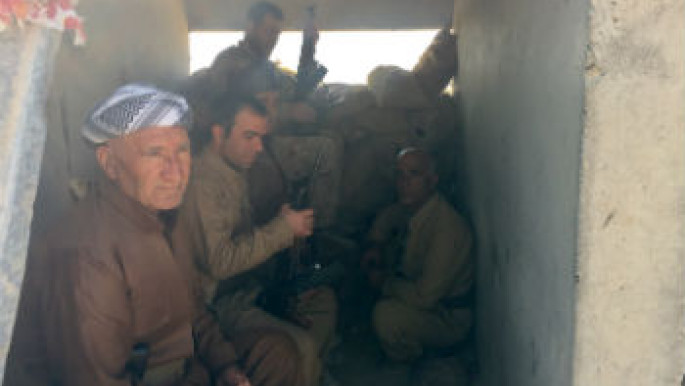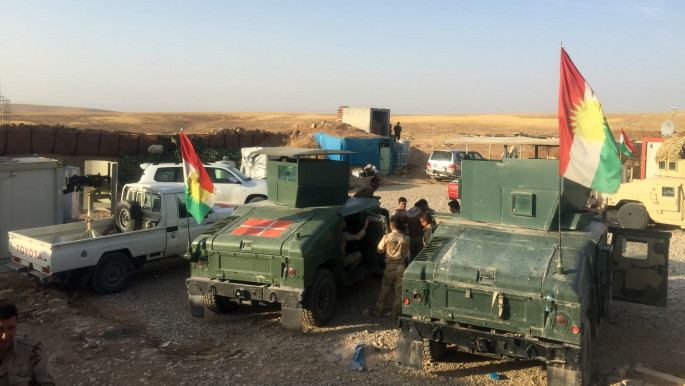Turkmen activists decry Turkey's military role in Mosul battle
The Peshmerga base in Bashiqa overlooks what were, until recently, positions held by the Islamic State group.
Black smoke filled the distant sky last week, as IS militants set fires in an effort to confuse US-led coalition jets striking their positions. The fires didn't work, and the Peshmerga, in support of the Iraqi army-led offensive to take Mosul from IS, cleared Bashiqa of IS militants on Thursday.
But the Peshmerga isn't alone in Bashiqa.
"The Turkish army is here too. They're training the Sunni al-hashd, and they have some good units," General Bahram Yasin told The New Arab, referring to the pro-government al-hashd al-watani militia.
On October 23, the Turkish army shelled IS positions in support of the Peshmerga, after days of the Kurdish soldiers marching towards IS in the desert - shooting their AK-47s, mortars and everything they had at the militants.
The Turkish army is indeed in Iraq to train the Sunni militia in the fight against IS, despite protests from Baghdad. And the militia includes members of Iraq's Turkmen minority - descendants of Ottoman soldiers who speak a Turkic language.
In Iraq's Turkmen community, some are welcoming Turkey's intervention against IS, which has reportedly taken 600 Turkmen women and children into captivity. But other Turkmen here, though supportive of the fight against IS, oppose the military presence of the country of their ancestors, feeling they must remain loyal to their own Iraqi homeland.
"We [Turkmen] are part of Iraq. Of course we will agree with the Iraqi state," said Dr Ali Akram, president of the Turkmen Rescue Foundation.
The NGO advocates for Turkmen rights, and last month released a statement condemning Turkish President Recep Tayyip Erdogan's suggestion that only Sunni Arabs, Sunni Kurds and Turkmen remain in Mosul after its liberation from IS.
"They have to respect Iraqi diversity and consider them as one single nation, and respect Turkmen as one single united nation, as we do not accept to be divided in a sectarian way," read the statement.
 |
|
| Turkmen are involved along with Kurds and others in the fight against IS in Mosul, but opinions are divided over Turkey's intervention [Adam Lucente] |
"Turkmen are against this idea of dividing us into Sunni and Shia. We think most problems in Iraq are based on sectarian division," added Dr Akram.
Dr Akram is not alone in his thinking. Turkmen opposition to the Turkish military presence in Bashiqa comes down to concerns over Iraq's sovereignty, a desire to prevent sectarian conflict, and loyalty to the Iraqi state.
"The Iraqi government absolutely rejected the placement of Turkish forces on Iraqi lands,"said Jasim Mohammed Jaafar, a Turkmen member of the Iraqi parliament. "The Iraqi security forces are able to liberate Mosul."
Turkmen Rescue Foundation spokesman Mehdi al-Beyati detailed the opposition of some in the Turkmen community.
"We have national and ancestral connections to Turkey, as seen in our use of the Turkish language, but our national and moral duty must be to Iraq," he said. "The Iraqi government has marginalised us politically, but this is not an excuse to support foreign agendas that spread hatred and discord in Iraqi society."
Another major Iraqi Turkmen organisation, the Iraqi Turkmen Front, declared its loyalty to the Iraqi state after the Mosul operations began, but takes a more neutral stance on Turkey's presence here.
"We are, first of all, Iraqi citizens. We are not the legacy of the Ottomans in Iraq," Ersat Salihi, president of the Iraqi Turkmen Front, told Al Hadath. "The presence of the Turkish army in Nineveh [the province in which Mosul lies] is not the Turkmen's doing."
 |
We are, first of all, Iraqi citizens. We are not the legacy of the Ottomans in Iraq |  |
Iraq should, however, have good relations with its neighbours. "The Turkmen can be a point of communication between Turkey and Iraq, just like the Shia are between Iraq and Iran, and the Sunni are between Iraq and the Arab states."
Salihi and other Iraqi Turkmen Front leaders did not respond to requests for comment.
Some Iraqi Turkmen, meanwhile, support Turkey's presence outright.
Kemal Bayatli, the president of the Federation of Turkmeneli Associations, said that Turkey's presence in Bashiqa was helping keep peace between the myriad groups fighting IS.
"Turkey is on the right path. Turkey needs to have the military power in the region in order to control and peacefully be done with the operation in Mosul," he told the Turkish state-run Anadolu Agency.
Iraqi Turkmen follow both Sunni and Shia traditions of Islam. Neither the Turkmen Rescue Foundation, the Iraqi Turkmen Front, nor any of the other main Turkmen organisations in Iraq, represent exclusively Sunni or Shia Turkmen. However, the Turkmen Rescue Foundation feels some want to divide the community along sectarian lines.
"Sunni Turkmen are closer to Turkey, but Turkey didn't support Sunni Turkmen in the past," said Dr Akram, citing what he perceived as a lack of support for both Sunni and Shia Turkmen kidnapped by IS since 2014, and before Turkey's intervention near Mosul.
 |
|
| Kurdish troops have been on the front lines of the fight for Mosul [Adam Lucente] |
Meanwhile, Dr Akram thinks Turkey shows favouritism towards Sunni Turkmen.
"Six to seven years ago I tried to get a scholarship in Turkey and was refused. It was obviously because I'm Shia. I think there's always a differentiation between Sunni and Shia."
The Iraqi Turkmen are mainly descendants of Ottoman soldiers, civil servants and traders who came to Iraq when Iraq was a province of the Ottoman Empire from the 16th century until the 20th. They speak Turkmen, a Turkic language that shares roots with modern Turkish, but is not identical to it. They also speak Arabic, and sometimes Kurdish, depending on where they live in Iraq.
Iraqi Turkmen refer to their historical homeland as Turkmeneli, a region of northern Iraq that includes Tel Afar, Mosul, Tuz Khormato and Kirkuk.
The Turkish military base in Bashiqa is only a few metres from the Peshmerga. Though not working 100 percent in tandem, it is clear Turkey gets along far better with the Peshmerga than they do the major Kurdish armed group in Turkey - the outlawed Kurdistan Workers' Party (PKK), with whom Turkey is in open armed conflict.
Turkey is one of the few places in the area where an Iraqi flag flies, as the Peshmerga prefers the green, red, and white Kurdish flag.
Just 19km from Turkey's base, several hundred Turkmen remain imprisoned by IS, along with other Sunni, Shia, Yazidi, and Christian victims of the infamous group.
Unlike Iraq and the Kurdistan Regional Government (KRG), the Turkmen have no autonomous region, despite recent calls for such from some community members. Regardless of what the future holds, many Turkmen want their homeland of Iraq, not their ancestral home of Turkey, to be the ones to defeat IS.
Fixing and translation services provided by Dana Mahmoud. Read more about the role of a fixer here.
Adam Lucente is on the outskirts of Mosul. Follow him on Twitter: @Adam_Lucente





 Follow the Middle East's top stories in English at The New Arab on Google News
Follow the Middle East's top stories in English at The New Arab on Google News


